As the automotive industry shifts toward sustainability, Stellantis is working to exceed the European Union’s stringent 2025 CO2 emissions targets.
The company expects its electric vehicle (EV) sales to significantly exceed the minimum requirements set by the European Union, driven by strong demand for its latest electric models. Stellantis Chief Financial Officer Doug Ostermann recently expressed confidence in the company’s trajectory at the Goldman Sachs Automotive Conference, highlighting the huge interest in the new Citroen e-C3 and Peugeot 3008 and 5008 electric SUVs.

New EU regulations require a reduction in average CO2 emissions for cars sold in the region, from 115 grams per kilometer this year to 93.6 grams per kilometer next year.
To comply with these regulations, Stellantis has calculated that pure electric vehicles must account for 24% of its total new car sales in the EU by 2025. Currently, data from market research firm DataForce shows that Stellantis’ electric vehicle sales account for 11% of its total passenger car sales as of October 2023. This figure highlights the company’s determination to transition to a greener automotive future.
Stellantis is actively launching a series of affordable small electric vehicles on its flexible Smart Car platform, including the e-C3, Fiat Grande Panda and Opel/Vauxhall Frontera. Thanks to the use of lithium iron phosphate (LFP) batteries, these models have a starting price of less than 25,000 euros, which is very competitive. LFP batteries are not only cost-effective, but also have many advantages, including excellent safety, long cycle life and environmental protection.
With a charge and discharge cycle life of up to 2,000 times and excellent resistance to overcharging and puncture, LFP batteries are ideal for driving new energy vehicles.
The Citroën e-C3 has become Europe’s second best-selling all-electric compact car, underscoring Stellantis’ strategy to meet the growing demand for electric vehicles. In October alone, e-C3 sales reached 2,029 units, second only to the Peugeot e-208. Ostermann also announced plans to launch a more affordable e-C3 model with a smaller battery, expected to cost around €20,000, further improving accessibility for consumers.
In addition to the Smart Car platform, Stellantis has also launched models based on the STLA mid-size platform, such as the Peugeot 3008 and 5008 SUVs, and the Opel/Vauxhall Grandland SUV. These vehicles are equipped with pure electric and hybrid systems, enabling Stellantis to adjust its sales strategy according to market demand. The flexibility of the new multi-power platform enables Stellantis to meet the EU’s CO2 reduction targets next year.
The benefits of new energy vehicles go beyond meeting regulatory standards, they play a vital role in promoting a sustainable future. By reducing reliance on fossil fuels and minimizing greenhouse gas emissions, electric vehicles contribute to a cleaner environment. The wide range of electric models offered by Stellantis not only caters to a variety of consumer preferences, but also supports the broader goal of achieving a green energy world. As more automakers adopt electric vehicles, the transition to a circular economy becomes increasingly feasible.
The lithium iron phosphate battery technology used in Stellantis electric vehicles is a powerful example of the advancement of energy storage solutions. These batteries are non-toxic, non-polluting and have a long service life, making them ideal for electric vehicles. They can be easily configured in series to achieve efficient energy management to meet the frequent charging and discharging needs of electric vehicles. This innovation not only improves the performance of electric vehicles, but also meets the principles of sustainable development and environmental stewardship.
Stellantis is well positioned to navigate the changing landscape of the automotive industry with a clear focus on electric vehicle sales and compliance with EU emissions targets. The company’s commitment to launching affordable, innovative electric models, coupled with the advantages of lithium iron phosphate battery technology, highlights its commitment to promoting a sustainable future. As Stellantis continues to expand its electric vehicle product line, it contributes to a greener energy world and a circular economy, paving the way for a more sustainable automotive industry.
Post time: Dec-16-2024


